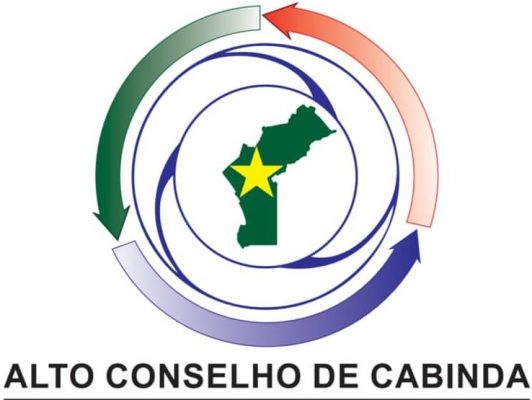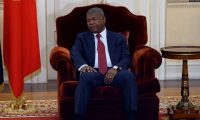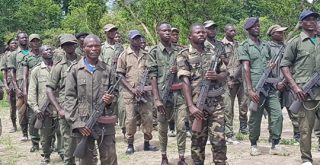Luanda – After more than four decades of struggle, flec is formally recognized as an armed or rebel group in Cabinda. Meanwhile, Angola intensifies the pressure on armed resistance. The recognition of the conflict is animating debates on the coherent dynamics for a peaceful settlement of the dispute between Cabinda and Luanda.
The recognition was made public on 1 May last by the Secretary-General of the United Nations, António Guterres. According to ABC News, 16 armed groups responded positively to the U.N. chief’s call for a global ceasefire to combat the coronavirus pandemic.
In developing the “lead” of the news, that journalism division of the “American Broadcasting Company” highlighted the location of the armed groups mentioned by António Guterres: Yemen, Myanmar, Ukraine, Philippines, Colombia, Angola, Libya, Senegal, Sudan, Syria , Indonesia and Nagorno-Karabakh. And the armed or rebel group in Angola has been identified in the document made public by the UN Secretary-General as the Cabinda Enclave Liberation Front (FLEC).
The recognition of the conflict in Cabinda follows António Guterres’ call for an “immediate global ceasefire” in all conflicts to preserve the lives of civilians in the face of the “fury” of the Covid-19 pandemic. Emphasizing his appeal, António Guterres said: “Put down your weapons, silence your weapons, stop the air strikes. Let us put an end to the scourge of war and fight the disease that plagues the world. This starts with the end of the fighting. Everywhere. Everywhere. Right away.“
The appeal was launched on Monday 23 March; and on 13 April 2010, FLEC responded positively to the call for a ceasefire.
However, António Guterres’ statement on the existence of the conflict in Cabinda is what Angolan President João Lourenço never wanted to hear from the UN, being accustomed to covering the sun with the sieve. Thus, always accustomed to running from side to side to convince that there is no longer conflict in Cabinda, he mobilized his military arsenal to strike another blow to the armed resistance.
The Angolan Armed Forces (FAA) resumed hostilities on 4 June, thus violating a ceasefire applauded by the UN. In the last 12 days there has been a record of clashes between the FAA and flec forces in various locations in Cabinda, especially in the areas of Massabi and Inhuca. The Angolan regime has always forgotten a great lesson in history: “The force does not do the right, that guerrillas are almost never defeated, that in the long run these “Davids” defeat the ‘Goliaths‘ by the strategy of saturation.”
Note, the steps on cabinda’s dossier at the UN date back to the 1960s, when, on 6 October 1960, from the top of the Tribune of the United Nations General Assembly, Stéphane Tshitshele, Vice-President and Minister of Foreign Affairs of Congo-Brazzaville presented cabinda’s problem to the International Community.
Stéphane Tshitsele’s speech at the UN censured Portugal for cabinda’s administrative integration in Angola, against the letter and spirit of the treaties – chinfuma’s, on September 29, 1883; chicamba on 26 December 1884; and simulambuco on February 1, 1885; these treaties accepted at the Berlin Conference, which elaborated the legal work of what is called “Colonial Charter”, a legal framework of reference in the decolonization process, in which Angola and Cabinda are taken as two separate entities.
And, following several other steps, the UN, through Resolution 1542 (XV) of 15/12/1960 considers Cabinda “an autonomous territory” with the right to self-determination; Quaison Sakey, the first major diplomat black Africa gave to the United Nations, presented the “Cabinda Issue” to the United Nations Security Council between 1962 and 1963;
However, the Armed Forces Movement (MFA), which led the military coup of 25 April 1974 in Portugal, ignored these resolutions in the process of decolonization. And the Alvor Agreements were concluded on January 15, 1975, between Portugal and the three Angolan liberation movements – MPLA, FNLA and UNITA. The parties agreed, among others, to the accession of Cabinda as an integral part of the future African State (Art.3 of the Alvor Agreements), without the prior consent of the enclave’s natives.
This is how Angola’s accession to independence in the context of the Cold War, the UN will feel outdated and cabinda’s dossier will submit to the dynamics of pragmatic ethics, influenced mainly by powerful third parties with strategic interests in Angola.
Since then, with rare exceptions, no government has ventured to interfere in Angola’s internal affairs without political reprisals. The overthrow of Pascal Lissouba, President of Congo-Brazzaville between 31 August 1992 and 15 October 1997, is eloquent. But the efforts continued, and for many political and civic personalities the struggle to replenish the cabins in their rights as a people is legitimate and necessary.
In the face of these steps, the UN has placed itself before a codified moral, by which it rarely reserves the right to influence or conduct the process of expressing the will of a people belonging to an entity it recognizes. Your position on the Cabinda dossier is a real deafening silence.
This silence has greatly harmed the cause of the Peoples of Non-Autonomous Territories, in particular that of Cabinda, who feel orphans of the UN decolonization process, although exceptionally permissible for the UN to conduct proceedings “in cases of genocide, crimes against humanity, failed states...”
On November 8, 1975, on the eve of Angola’s accession to independence, it takes on the proportions of an armed conflict.
Cabinda leaders have often been advised to engage in dialogue to resolve the conflict. Or at least they have taken initiatives in this direction, but there is a scientific principle that says: “Every conflict has a solution as long as both sides have a common goal.” However, for almost 45 years of cross fire this common goal between Angola and Cabinda has not yet been found.
The rounds of negotiations taken so far are ritualized ceremonies, stripped of any involvement of the UN or at least the AU, by demands of the current regime of Luanda, and watched by the Angolan secret, always committed to the strategy of dividing to better reign.
In addition to the non-involvement of the International Community, the fragility of these meetings is reflected first and foremost in ostracism: the expulsion of key and prestigious institutions and personalities linked to the process itself, or who, at least, have offered themselves to offer their services to the process; and, above all, the persistence of the dogmatism and centralism of Luanda, which confiscated for itself the monopoly of the “Cabinda Question” – as a kind of state secret – and excludes the possibility of giving the people of Cabinda the possibility of ruling on their fate.
In desperation of cause, some political authors from Cabinda deserted the armed resistance assumed the commitment of integration in angolan institutions and responding to an old desire of the settlement of Luanda, in the figure of António Agostinho Neto, according to which “Angola is one People, one Nation”.
Signed under the pretext of pacifying Cabinda under special status (EE) and thus freeing up more resources to rebuild and develop cabinda territory, the Memorandum of Understanding proved to be a meticulously warped project for the happiness of the man of the ‘en place’ regime, thus becoming a mere statement of intent: anointed with high benefits, the tormentors continued to take economic advantage of cabinda’s natural resources pandemic.
Consequently, the autochthonous of the Enclave remained victims of the patifarias criminals already amnistiadas in the so-called peace process, to be tortured by “despotism arising from a governance proper to a colonized state of feudal type”.
From here we see clearly an initiative of a pseudo peace process that, addicted by ideological prejudices and petrophobic interests, has structured itself in the search for a synthesis around the status quo, leaving room for an unrealistic view of the “Cabinda Question”.
For this reason, conflict is now a reality, and continues to reap many human lives. The cabins are marked by this long conflict. There is no family in Cabinda that is not marked directly or indirectly by the adverse effects of the conflict. They are the marks of disastrous decolonization and the failures of the international community, of the discrimination and injustices suffered over the last 45 years, of never recognizing their inalienable right to live as a people.
In short, the current political and legal framework is understood as an appropriation of the territory of Cabinda, ignoring its inhabitants or at least reducing them to the status of servants of the gleba, who, placed under close control of the state security forces, cannot make any complaint stemming from the problems of poverty, disease, hunger, murder, injustice, social exclusion and politics to which they are voted.
In this context, we can understand that self-determination is of vital importance for the lives of the people of Cabinda and on the path of growth of their identity. In fact, the sun when it rises is for everyone, which reminds us that international law is for all peoples.
Therefore, and following the statement made by António Guterres, it is up to this question the central role: “What can be done, to encourage the human spirit of social authors, in particular the regime, and thus find the way to a lasting peace for Cabinda?“
In this order of ideas, speaking only of peace does not have the possibility of attracting the people of Cabinda, unless they feel touched “by something fascinating”, such as Truth and Justice that guarantee a worthy future for their children. For this reason, the UN must therefore overcome the silence to which a certain stagnation dictated by the interests of powerful third parties, even within political pragmatism, voted for it.
Therefore, we must transcend a peace to fight the Pandemic of Covid-19, and reopen the process of non-autonomous peoples, as António Guterres promised at the beginning of his Mandate as SECRETARY-GENERAL of the UN, and to hold accountable the administrators of these Territories who, in their fury against the principle of peoples to dispose of themselves, even mock those who for this right to debate even sacrificing them.
And let us hope that the recognition of the conflict in Cabinda by António Guterres will be a step towards the UN assuming its responsibilities in the process of restoring a true peace founded on justice and the dignity of peoples for the territory of Cabinda.
(*) Human Rights Activist













